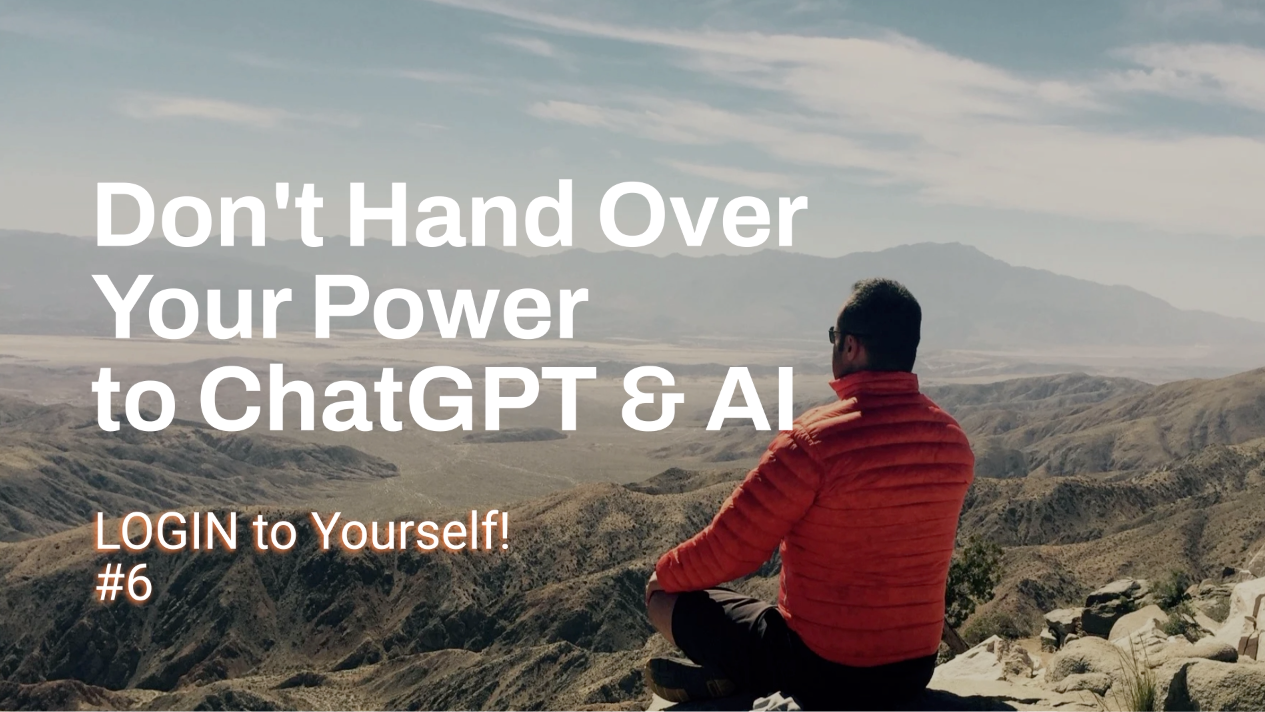Don't Hand Over Your Power to ChatGPT & AI
The Rise of AI and tools like ChatGPT create a whole new challenge for humanity. How can we stay human in a world controlled by zeroes and ones, controlled by the Machine Mind. In this video I will explore the challenges AI brings to our human nature and our ability to stay connected to ourselves.

Today, I have a fascinating topic to discuss - AI and its impact on our humanness. As a digital business consultant, I am not an AI expert, but I have previously worked on fun projects related to AI technology. In this discussion, I want to explore its impact on our humanity rather than the technical aspects of AI.
The rise of Chat GPT and other AI technologies has been phenomenal. They can perform various tasks, from writing articles to solving complex problems. However, my concern lies in how it affects our creativity and our ability to be innovative. As humans, we can create novel and creative ideas, something that AI cannot do. While AI is a fantastic tool, it cannot generate original thoughts, unlike humans. Therefore, we must be cautious about how much power we are willing to give away to these AI systems.
At Login to Yourself, we focus on the effects of digital devices and information technology on our humanness. Stay connected to our hearts, minds, and bodies is essential to preserve our humanity. Maintaining our creative and spiritual abilities is crucial, rather than handing them over to machines.
In conclusion, while AI technology has made great strides in recent years, we must be mindful of the potential dangers of relying too heavily on it. It is vital to maintain a balance between technology and humanity.
There is a significant discussion about the nature of AI, and I hope to have experts on my channel in the future to explore this topic further. Many people expect AI to be sentient and have a physical body, but it is not a living organism and cannot have these qualities. While I am not up-to-date with the latest discussions on singularity, there is a trend towards a hybrid human being that possesses the mind of a computer while still maintaining its human form. However, in my opinion, AI can't become sentient. I am open to discussing this topic with others who are interested.
My main concern is the extent to which we give AI power. Are we doing so out of convenience? In my current book, I have a chapter that discusses the invention of the computer and why it was created. The computer was designed to make mathematical calculations and navigation easier for humans. As computers have become faster and more powerful, they can simulate many brain functions. However, we must remember that this is all left-brain thinking; it is all binary and dualistic. The human mind is much larger than this, and we must not entrust ourselves to machine-like thinking.
As we engage more with digital devices and online information, our minds become more like machine minds, focused on binary thinking and taking stances on issues. Digital Detox and Dopamine Fasting are on the rise. In reality, life is much more nuanced than this. A whole range of experiences and perspectives falls between the extremes of black and white. We must remember the nuances of life and remember that we are not computers. We are spiritual beings with the capacity for compassion and the ability to experience the world in unique and diverse ways.
As AI continues to rise, it enormously impacts our minds. We must be cautious of creating technology that encourages humans to think like machines rather than embracing the richness and complexity of human thought. Processing the vast amounts of information we encounter daily can be challenging, but we must strive to maintain our humanity and resist the urge to become machines ourselves.
With the advent of AI, we are now facing a technology that mimics human behavior and capabilities, which presents a new set of challenges. One of our biggest challenges is determining whether a human or an AI created content and information. Google is already considering using watermarking to mark content created by AI. However, distinguishing between human-created and AI-created content will always be challenging, even with such measures.
The problem is that we expose ourselves to even more manipulation by engaging with AI-generated content. It is essential to disconnect from technology profoundly and mindfully, as we are inundated with excessive, unusual information every day. We must process this information and use our energy to process it. By logging into ourselves, connecting to our hearts, and using specific methods and practices to connect with our bodies, minds, and hearts, we can find answers to our life problems within ourselves.
In the future, I will share some practices to help you continuously maintain that connection to your heart. If we spend five to six hours a day on our devices, we lose our connection to our hearts and feelings, our discriminating wisdom, and our ability to notice differences and changes in our bodies and minds. Negative energies, feelings, and negativity can come in and make us sick and unhappy if we don't take the time to disconnect.
Becoming aware of these challenges is the first step. We must be cautious and develop awareness around our device behavior and usage. It's also essential to question the information we engage with, whether it was created by a human or an AI, and what the intention behind the content is. Awareness is the key to change, and we must be mindful of our engagement with technology to maintain our connection to ourselves and make our own decisions.
Note: ChatGPT was used to format this content
